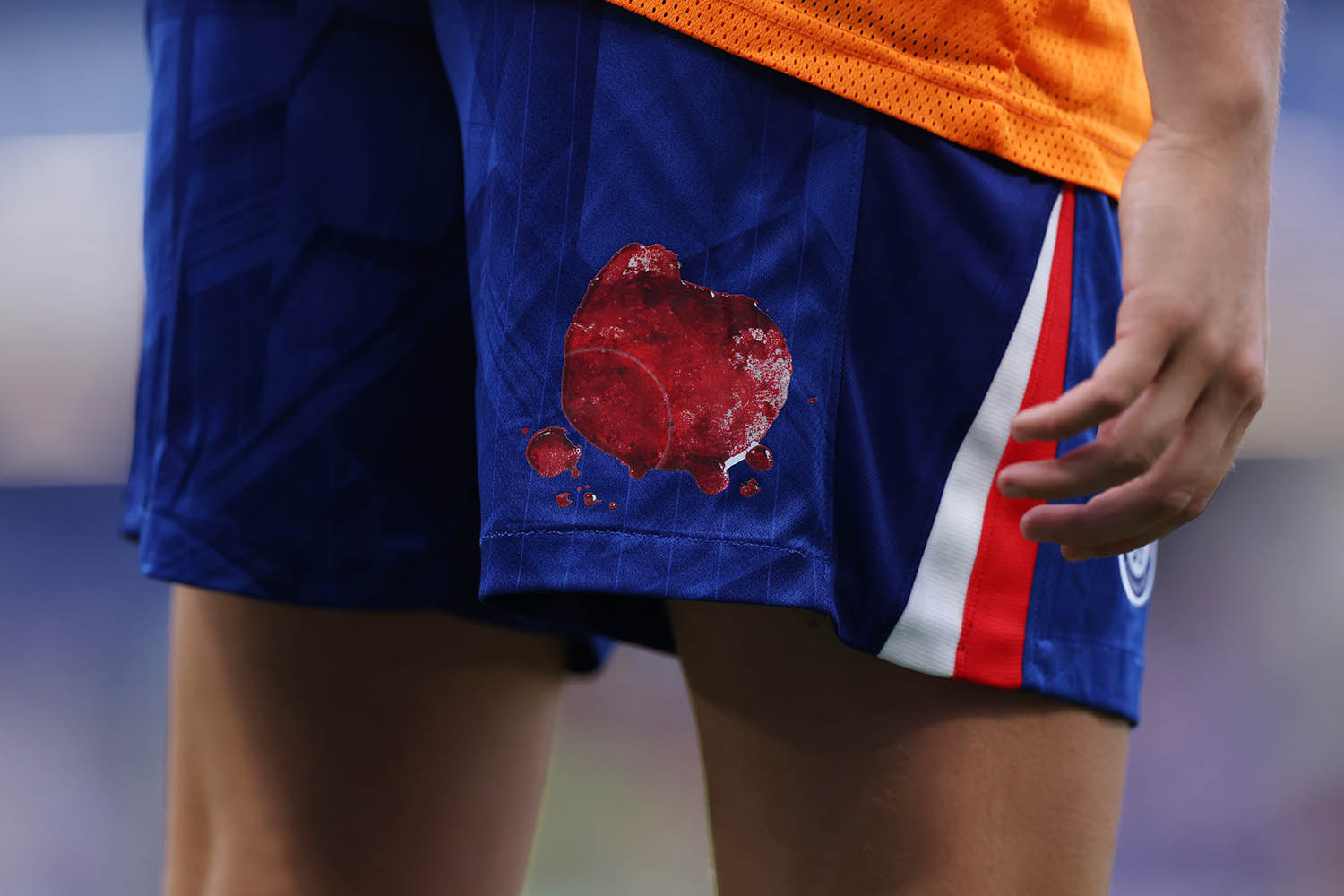As defending WSL champions Chelsea warmed up for their opener last weekend against Manchester City, blood-red marks on their shorts could be seen from the stands at Stamford Bridge.
The stunt was to mark a new back-of-short partnership with female-owned period care brand Here We Flo to raise awareness about the stigma that still surrounds periods, as well as spotlighting the importance of menstrual health.
The campaign also brought to the fore a significant shift in top-flight women’s football towards recognising that tracking menstrual cycles should no longer be an afterthought, but a key pillar in players’ training regimes, with teams like Chelsea leading the way.
Under the former leadership of Emma Hayes, Chelsea were the first team in the league to bring a major focus to periods and bring in a specialist to help the team understand the significance of their menstrual cycles.
But when Dr Georgie Bruinvels, a senior sports scientist, was first brought in by Hayes in 2018, she was surprised to find how little the players knew about the impact of their cycles on their fitness.
“I just remember this was such a grounding point for me of women’s football and where it’s at. At the time, there was no understanding or education for the players on their bodies or how they can help themselves,” she told The Observer.
Now the squad, with the help of Bruinvels and the period tracking app she developed, FitrWoman, has integrated an understanding of each player’s individual cycle to improve performance and manage symptoms through a multi-disciplined approach to their nutrition, training, and recovery.
“Women have been having periods forever, otherwise there wouldn’t be any children out there. But it’s a new discussion as to how this can be weaponised. I think that’s the message that we’re really trying to embed into our players”, said Bruinvels.
Related articles:
For Niamh Charles, Lioness and Chelsea full-back, the club’s approach means starting her period – like she did on the morning of the Women’s Euros final – is no longer a “bad thing” but “empowering”.
“What I have really learnt since coming to Chelsea is that it’s not just the week that you are on your period. There are lots of different phases, not just the one where you bleed, where you can actually make a difference to your whole cycle and your wellbeing,” Charles says.
Newsletters
Choose the newsletters you want to receive
View more
For information about how The Observer protects your data, read our Privacy Policy
The menstrual cycle consists of four phases over around 28 days: menstrual, follicular, ovulation and luteal. Each phase affects the body differently and can vary significantly depending on the person.
For example, one study found 77% of female athletes experience negative symptoms in the days leading up to and during menstruation, including fatigue and digestive issues.
Whereas during the follicular phase, increased oestrogen may increase energy, strength and coordination. Last month, a study from the University of Copenhagen suggested that increasing high-intensity sprint training in the follicular phase of the cycle over the luteal phase led to better outcomes and more efficient muscle adaptation for those who are endurance trained.
Unlike other parts of team strategy which coaches may want to keep secret from the competition, the attitude with cycle tracking appears to be of teams bringing everyone up to speed with them.
In 2019, the first team to break ground publicly on integrating menstrual cycle tracking was the US team ahead of their successful bid for a fourth World Cup final.
Dawn Scott, who coached the US women’s team and Washington Spirit in the National Women’s Soccer League, credited the breakthrough use of tracking their periods as one of the strategies the team deployed to help them win.
The Lionesses medical team has also been open about the squad using the FitrWoman app since 2021 to help the team track their cycles ahead of major tournaments.
In her prep for the Euros, tournament star Lucy Bronze said learning how to properly track her cycle has been “instrumental” to her performance on the pitch.
“I’ve been with the Lionesses for a while, and it’s so cool to see how they’ve gone from strength to strength,” Bruinvels said.
Even basic changes like switching the colour of England’s shorts from white to blue in 2023 after players expressed concerns about playing during their period have had an impact.
‘If you’re considering every other performance aspect, it seems bonkers to exclude periods’
‘If you’re considering every other performance aspect, it seems bonkers to exclude periods’
That approach is also filtering down into other squads who may not have the financing and resources of Chelsea or the Lionesses to bring the expertise which could support the players.
From this season, it’s now mandatory for every squad in the WSL to have a female health lead and develop a female health strategy, thanks to a partnership with The Well HQ, a company which specialises in delivering female health strategies for sport.
Dr Emma Ross, The Well HQ’s chief scientific officer and co-founder, began work monitoring menstrual cycles for Olympic and Paralympic athletes in 2017 at a time, she says, when only a handful of sports were monitoring athletes’ cycles.
Since then, Ross explains the dial has significantly shifted across elite female sport in the importance of menstrual cycles – alongside new research on pelvic floor health, the impact of training on fertility and how athletes can recover after pregnancy.
“It’s important for how women feel, and it’s important for how women can perform. And actually, if you’re considering every other aspect of their performance, it seems bonkers to exclude that”, Ross explained.
Although there is a lot of excitement about how players can “weaponise” their menstrual cycle to improve their performance, research into the impact of the hormones that underpin the cycle is still sparse in comparison to the volumes published examining men’s physiology.
Some research has also indicated how there may be a link between the prevalence of ACL injury and the menstrual cycle.
But at its most recent medical symposium, UEFA reported there was “not consistent enough evidence to suggest that there is an association between the menstrual phase and ACL injury”.
Part of the new partnership between Here We Flo and Chelsea is also about raising awareness and reducing stigma around periods for the droves of young girls becoming fans of the WSL.
Research from Women in Sport in 2022 found 78% of girls avoid sport when they have their period and 43% who once considered themselves ‘sporty’ disengaged from sport following primary school, often for fear of judgement or lacking confidence
For Ross, there is still a long way to go in making sure anyone who menstruates – whether they are in a spin class or competing in a World Cup final – is informed enough that they can still perform wherever they are in their cycle.
“If every sport, and every woman who was trying to be active could say, I can manage my period well, it doesn’t cause me undue stress, and I’m available every day of my cycle to give whatever I want, that would be a game changer.”
Photograph by Catherine Ivill/Getty



